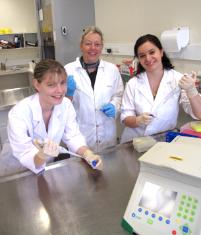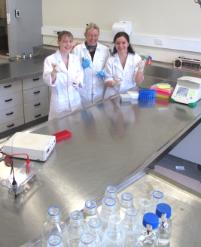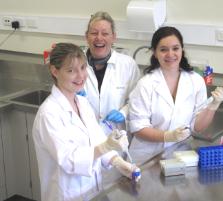Diverse paths all lead to a positive reaction about science
Published on 09 December, 2010
PhD students Sabine Smith-Flenady, Amy Suthers and Candice Pullen have followed diverse paths to end up in the same laboratory complex at CQUniversity in Rockhampton.
Amy completed high school in Australia and has worked her way through the system from undergraduate biomedical sciences to honours and now PhD research. She is now examining the role of the B-cell which produces antibodies when kangaroos and wallabies are combating bacteria.
In contrast, former Austrian Sabine had an early job as a ski instructor before embarking on a range of careers and then focusing on science. She studied astrophysics at the University of California, Berkeley and worked at NASA with Carl Sagan's planetary exploration program, before coming to Australia as an accountant and working as the CEO of a shipping company. Sabine is now examining the role of a population of white blood cells in the immune response of kangaroos and wallabies.
Both Sabine and Amy recently won travel awards from the Molecular and Experimental Pathology Society of Australasia so they could deliver oral presentations to the Australian Health and Medical Research Congress (held in Melbourne in November).
Meanwhile, former South African Candice started her biomedical sciences degree in Mackay before heading south to Rockhampton, where she has taken up her doctoral studies into the role of pharmaceutical agents resveratrol (an antioxidant found in red wine and in the skins and seeds of grapes) and nebivolol (a novel beta-blocker) on the disease processes linked to diabetes and high blood pressure.
Earlier this year, Candice and her laboratory members Rebecca Vella, Douglas Jackson and Saquiba Yesmine won travel awards from ISHR (international Society of Heart Research) to present at a international conference in Kyoto, Japan.
Australia needs more science graduates to create a healthier community, to support the growth of industry and to ensure we can sustain growth by preserving our environment.
Getting your foot in the door of a science degree opens up plenty of pathway options, ranging from higher degree research to jobs in the government and industry sectors. An undergraduate science degree can also be a springboard for programs required for entry into specialty health and medical professions.
CQUniversity offers a range of science-related degrees, including the Bachelor of Science and Bachelor of Environmental Science.
The final date to change or add your preferences with QTAC is January 6 and the final date for late applications is January 20. Applicants can also visit www.cquni.edu.au or phone 13 CQUni for more information.'

L-R Amy Suthers, Sabine Smith-Flenady and Candice Pullen. LINK for a larger image 
Amy, Sabine and Candice. LINK for a larger image


